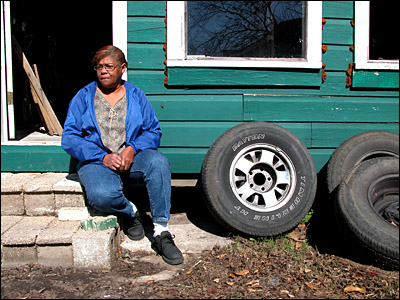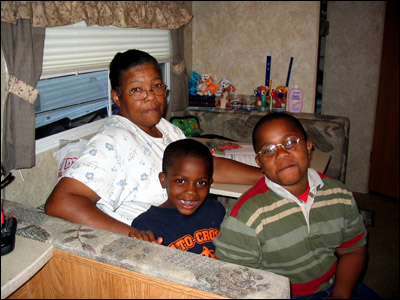 |
 | ||
|
Ethel Curry part 1, 2 "This back window here, the water was up to the top," Ethel Curry says while standing outside the ravaged shell of her house. "It was like a front loading washing machine. The water was sloshing from side to side."
The foul, gritty water burst into her house. A refrigerator tipped on its back and began to float, the door splayed open. Frantic for a safe place, Ethel climbed inside. Then the tide pushed her makeshift raft up against the ceiling. She punched through the ceiling tiles to get air. The water kept rising. "And I say, 'Lord, please take it down because if it come any higher, I can't swim,'" Ethel says, choking back a sob. "I was through the rafters, holding my head up, trying to keep it from getting in my mouth." Ethel floated in the refrigerator for hours before the flood waters drained away. The house where she and her 11 siblings grew up was still standing, but everything inside, including the walls and floors, got destroyed. Ricky Mathews, publisher of the Mississippi Gulf Coast's Sun Herald newspaper, says Hurricane Katrina was an equal-opportunity destroyer. "It doesn't matter if you're poor or rich," he says. "On every socioeconomic level, Katrina was the ultimate equalizer." At first glance, Katrina may have put the rich and poor on equal footing. But it was an illusion. The hurricane destroyed the possessions of both rich and poor, but people who started with less are having a harder time building back. As Ethel Curry set out to salvage the pieces of her storm-damaged life, she didn't have much of a safety net. She didn't have insurance policies or people to borrow money from. She had few family members who would help her. Ethel is bright and articulate, but she has little economic savvy or knowledge of how to work a bureaucracy. Ethel speaks softly. She has a sturdy bearing and playful smile. It takes some time to notice that her lower teeth are missing. As the second-oldest child, Ethel always played the family caretaker. When her mother died in the early 1980s, Ethel's father sank into alcoholism. "I worked two jobs during that time, and was coming home one night. He was sitting on the corner. He had gotten robbed." Ethel and her older sister took their father to the hospital. Ethel made a decision to move in with her father to help out. "Everybody said we had a strange relationship, but we had a good relationship. It was the ones that didn't help take care of him that had the strange relationship. I never regretted it for one minute." Ethel cared for her father until he died. Then she stayed on in the family home. Ethel ran the house as a refuge for family members who needed a place to live for a while, or whose children needed a caretaker. She has guided five sets of children to adulthood.
At age 60, Ethel is now raising a nephew's two sons. Dezmond is eight; Brandon, seven. Brandon was abandoned by his mother when he was a newborn in the hospital. Brandon's father readily accepted Ethel's offer to raise the baby. Ethel is living in a FEMA trailer with the two boys. It's parked in the yard by her empty, one-story house. In February, 2006, nearly six months after Hurricane Katrina, Biloxi housing inspector Scott Underwood dropped by to see if the house should be torn down. He looked around and decided it was a toss up. "Structurally, the house can be built back to the way it was," Underwood said. But it will be costly. It would almost be easier to tear it down and rebuild.
Continue to part 2 |
||
 Ethel Curry sits on the steps of her hurricane-damaged house.
Ethel Curry sits on the steps of her hurricane-damaged house.
 Curry and her "grand nephews" Brandon (center) and Dezmond.
Curry and her "grand nephews" Brandon (center) and Dezmond.